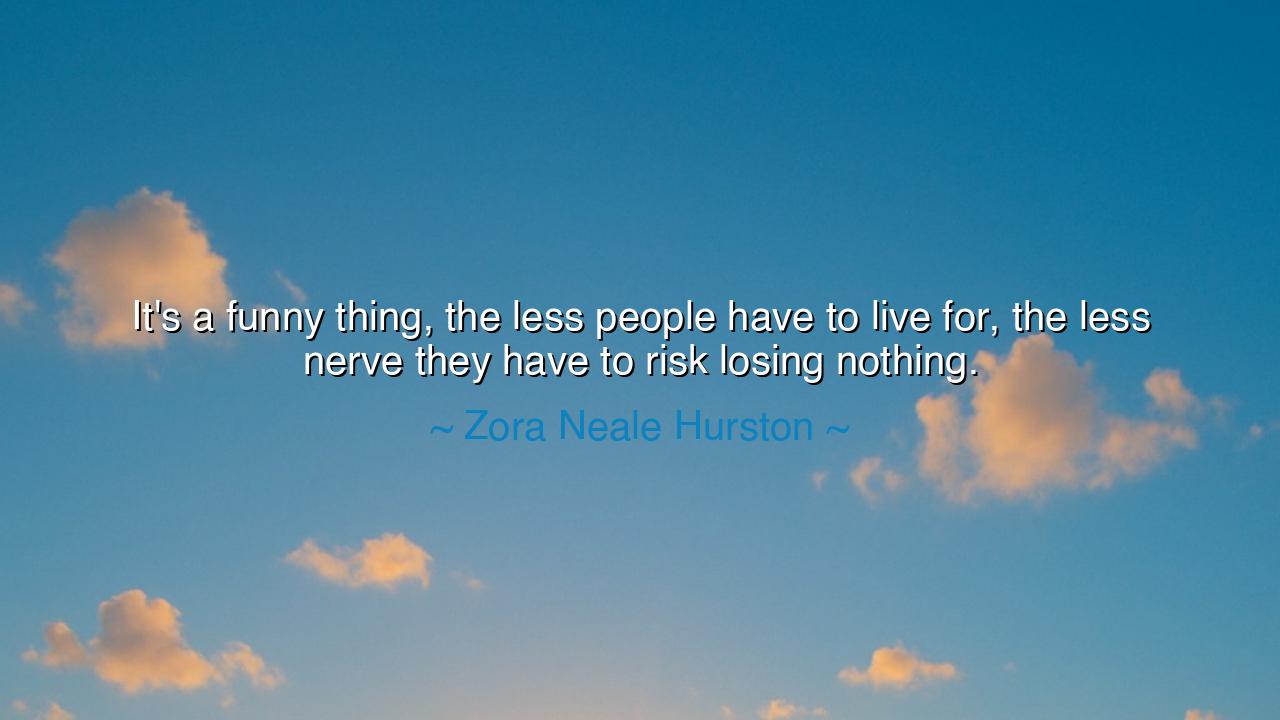
It's a funny thing, the less people have to live for, the less
It's a funny thing, the less people have to live for, the less nerve they have to risk losing nothing.






“It’s a funny thing, the less people have to live for, the less nerve they have to risk losing nothing.” So spoke Zora Neale Hurston, a woman of flame and thunder, whose words dance between sorrow and defiance. At first, her saying seems wrapped in paradox, yet beneath it lies an ancient truth: when the soul grows empty, courage withers. For courage is born not from despair, but from meaning—from the fire that burns within one who has something to lose, something worth the ache of striving. The one who feels hollowed out by hopelessness grows timid, for they have forgotten the sanctity of life’s struggle. It is not the abundance of things, but the presence of purpose, that gives nerve to the heart.
In ages long past, the philosophers of stone and scroll spoke of this mystery. The Greeks named it thumos, the spirited breath that gives rise to bold action. When thumos dies, a person becomes like a leaf adrift, moved by every wind yet rooted in none. Hurston saw in her time that the soul without purpose grows brittle. It is not fear of death that restrains such a one—it is fear of living. The less a person believes their life has meaning, the less they will risk, even though they have nothing left to lose. For when hope departs, so too does daring.
Consider the story of Harriet Tubman, born in bondage yet filled with an unbreakable light. She had everything to lose—her life, her freedom, her fragile safety—but she also had something vast to live for: the liberty of her people. Each journey along the Underground Railroad was a walk between life and death, yet she moved with the surety of purpose. Compare her courage to the paralysis of those who have surrendered to despair. Those who believe nothing awaits them beyond suffering find no reason to act, for their hearts have grown numb. Tubman’s faith gave her nerve, and her nerve carved freedom from darkness.
This is the essence of Hurston’s wisdom: those who live without hope shrink from risk, even when the loss is small, for their spirit has become weary of striving. It is not poverty that weakens them, but the absence of vision. A pauper who dreams of dawn walks taller than a king who feels nothing for his crown. Thus, the measure of a person’s courage is not found in their possessions or their safety, but in the weight of what they cherish. The more one loves—life, truth, or justice—the more one dares.
Let this teaching be a mirror to our age. Many wander in comfort yet tremble at every uncertainty, while others, who have little, walk bravely toward storms. Comfort without purpose breeds cowardice; struggle with meaning breeds strength. To restore our nerve, we must restore our reason to live. Seek not merely pleasure, but that which stirs the soul to rise. For when the heart is aflame with cause, fear melts like frost before the morning sun.
The ancients taught that courage is not the absence of fear, but the triumph over it. Hurston’s words remind us that one cannot triumph over fear without first embracing life’s worth. A soldier does not fight because he loves battle—he fights because he loves peace, and those who dwell within it. Likewise, one risks much only when life holds something sacred beyond survival. Meaning gives birth to nerve.
Therefore, take this as your daily vow: find something to live for. Tend it as a flame in the hollow night. Build a purpose so strong that even the threat of loss cannot silence you. Whether it is the love of family, the pursuit of truth, or the service of others, let it be your reason to rise. And when doubt whispers that all is meaningless, remember the wisdom of Hurston—those who have nothing to lose often lose themselves first. But those who hold something dear, though fragile, become mighty.
So go forth with heart unyielding. Let your life be rich not in possessions, but in purpose. For it is the purpose that gives nerve to the soul, the courage to act, and the will to stand before the unknown. In this way, the ancient fire of meaning will guard you, and you will not merely exist—you will live.






AAdministratorAdministrator
Welcome, honored guests. Please leave a comment, we will respond soon